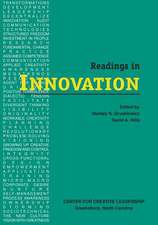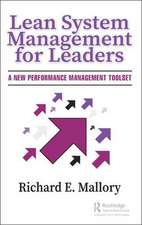Quality Standards for Highly Effective Government, Second Edition
Autor Richard E. Malloryen Limba Engleză Hardback – 11 apr 2018
The problem sounds huge, but the solution is not all that difficult. Quality science can provide a structure for efficiency and effectiveness, democratic institutions can create consensus goals, and auditable standards can show where these issues exist and to what degree. In addition, it can drive change where it must happen, because if you can measure it, you can manage it.
Auditable quality standards can make these unknowns highly visible and offer a clear scorecard that anyone can follow. They can provide holistic and thorough measurements because they will align with the unique roles and responsibilities at three fundamental levels of leadership in government: (1) Work unit supervisors and managers at the "front line" of government service; (2) chief executives, department directors, and their deputies as "Executive Management" of government agencies, and (3) elected top leadership, as those key officials must define the priorities, outcomes, programs, and budgets.
This book proposes that a focus on efficiency and effectiveness, combined with its defined value, provides the foundation of effective government, and of its audit standard.
In this book, you will learn four necessary strategies that will support the use of these standards including:
- Creating an imperative for consensus
- Ending incentives for building bureaucracy
- Building a safety net for champions of efficiency
- Making elected representatives accountable for results
Preț: 212.87 lei
Preț vechi: 257.01 lei
-17% Nou
Puncte Express: 319
Preț estimativ în valută:
40.73€ • 43.56$ • 33.96£
40.73€ • 43.56$ • 33.96£
Carte tipărită la comandă
Livrare economică 18 aprilie-02 mai
Preluare comenzi: 021 569.72.76
Specificații
ISBN-13: 9781138482395
ISBN-10: 1138482390
Pagini: 110
Ilustrații: 3 Tables, black and white; 5 Illustrations, black and white
Dimensiuni: 156 x 234 x 14 mm
Greutate: 0.3 kg
Ediția:1
Editura: Taylor & Francis
Colecția Productivity Press
Locul publicării:Oxford, United Kingdom
ISBN-10: 1138482390
Pagini: 110
Ilustrații: 3 Tables, black and white; 5 Illustrations, black and white
Dimensiuni: 156 x 234 x 14 mm
Greutate: 0.3 kg
Ediția:1
Editura: Taylor & Francis
Colecția Productivity Press
Locul publicării:Oxford, United Kingdom
Public țintă
Professional and Professional Practice & DevelopmentCuprins
Introduction
Chapter 1: The Problem and Auditable Quality Standards as Solution
Chapter 2: Quality Science as a Backbone
Chapter 3: The Process Management Standard
Chapter 4: Scoring the Process Management Standard
Chapter 5: The System Management Standard
Chapter 6: Scoring the Systems Management Standard
Chapter 7: The Aligned Leadership Objectives Standard
Chapter 8: Auditable Standards as a Catalyst for the Future
Chapter 9: Three Necessary Strategies
Chapter 10: Necessary Culture and Values
Chapter 1: The Problem and Auditable Quality Standards as Solution
Chapter 2: Quality Science as a Backbone
Chapter 3: The Process Management Standard
Chapter 4: Scoring the Process Management Standard
Chapter 5: The System Management Standard
Chapter 6: Scoring the Systems Management Standard
Chapter 7: The Aligned Leadership Objectives Standard
Chapter 8: Auditable Standards as a Catalyst for the Future
Chapter 9: Three Necessary Strategies
Chapter 10: Necessary Culture and Values
Descriere
A seminal work for the public sector, Quality Standards for Highly Effective Government (Second Edition) redefines what is expected and what is required for excellence in management. The practices presented here also benefit non-profit organizations, and indeed any organization in which services are not directly rewarded by a purchase.
The book introduces three new performance standards that frame the value add of management, for processes, systems, and aligned leadership objectives. Along with defining known best practices, these standards create an imperative for the use of Lean and continuous quality improvement as a foundation for good management, built onto that defined structure.
The book introduces three new performance standards that frame the value add of management, for processes, systems, and aligned leadership objectives. Along with defining known best practices, these standards create an imperative for the use of Lean and continuous quality improvement as a foundation for good management, built onto that defined structure.
























